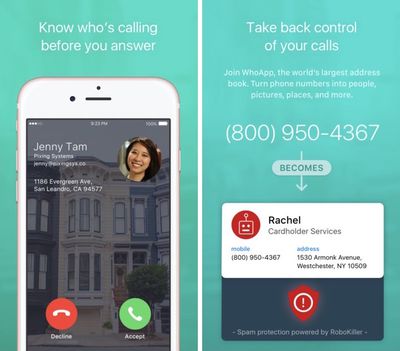A new iOS app launching today, called WhoApp, plans to provide its users with detailed information about unknown callers soliciting their smartphones. Created by developer TelTech, WhoApp promises to recognize calls from telemarketers, wrong numbers, and potential scammers by returning information about the unknown dialer's name, picture, address, and even a Google Street View image of their location.
The app works through a two-step process: when users receive an undesirable call from a number not stored in their iPhone, they hit the decline button to send the call to WhoApp. Next, the app dials back the number to your phone with all of WhoApp's promised data points, allowing you to make a better decision about whether or not the call needs to be answered or ignored.
“For nearly a decade, we have focused on building innovative privacy and security apps that help people take control of their phones, and WhoApp will be another game-changer for iPhone users constantly wondering, ‘Should I take that call?’” said Meir Cohen, WhoApp’s CEO. “Turning caller ID into a name, face, and even a person’s front lawn was never before possible, and will change the way we use our iPhones.”
TelTech created a similar app before, called TrapCall [Direct Link], but WhoApp notably differs from the company's previous unknown caller ID creation in that it's free to download and requires no subsequent in-app purchases or paid subscription services.
WhoApp has a few other features as well, including its own phone dialing pad that lets users look up information on a phone number to find more information about someone before hitting the dial button. TelTech also says that the app "learns and grows with every call," getting smarter with age in determining between different types of calls, from scams and telemarketers, to someone potentially important not yet stored in your smartphone.

Privacy and information gathering may be an issue for some users interested in WhoApp (the setup process requires access to an iPhone's address book, and it's heavily encouraged for users to connect to Facebook), but TelTech has launched a suite of call-related apps that have encouraged individual privacy. One of its previous creations, RoboKiller, won the FTC's anti-robocall competition last year, and another encourages identity protection by spoofing a user's real name and number on other smartphones to ensure anonymity.
WhoApp is currently available exclusively on the iOS App Store [Direct Link], but TelTech is additionally planning to launch the app on Android sometime this fall.
Update: WhoApp has been removed from the App Store, which the company claims is a temporary move to clean up the app and relaunch it in the coming weeks. Its removal is theorized by some to be at the hands of Apple due to privacy concerns, since the app accesses a user's address book to add entries into its massive "Contacts Database," bolstering its unknown caller identification features. According to one MacRumors tipster, "The app stole the address book info on my computer and sold it."



















Top Rated Comments
"When you give WhoApp permission to do so, WhoApp accesses your mobile phone’s address book and collects the names, phone numbers, addresses and certain other information about your contacts ("Contact Information"). WhoApp incorporates Contact Information into a database that it maintains of all its users’ contacts (“Contacts Database “). When your Contact Information is incorporated into the Contacts Database, it is no longer linked or linkable back to you. The Contacts Database is used by WhoApp and by apps that are offered by the company that offers WhoApp (or its affiliates) to fulfill customers’ requests for service and to improve each app’s services for its customers. PLEASE BE AWARE THAT IF YOUR PHONE’S ADDRESS BOOK CONTAINS AN ENTRY FOR YOU, THAT INFORMATION WILL BE DOWNLOADED TO THE CONTACTS DATABASE JUST LIKE ANY OTHER CONTACT INFORMATION."
No thanks - I don't want my friends/family (with address and pictures?) to be entered in here, and I hope they wouldn't either.
Edit: Is this even legal? Sharing personal information of others w/o consent? This is really scary/sketchy stuff. If each phone has an average of say, 50 contacts, and they get 100,000 users...
WhoApp
Next up: WhereApp, WhenApp, WhyApp?
What we really need is tougher regulation of phone numbers and the companies or entities behind them. There needs to be a system where a number can get flagged by users, and then a government agency investigates the business or entity. It's incredible to me that there are so many businesses and shady operations able to get an actual phone number that they can then use to spam and scam innocent people. Many times older people (I mean old enough that they get confused easily) are taken advantage of by these people. How can they get a phone number without some sort of deeper information provided to the phone company? To get a phone number, you should have to register a lot of verified personal info, and then be held responsible for what happens on that phone line. It shouldn't be so easy to get a phone number anonymously.